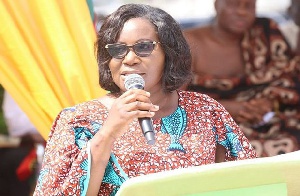 Elizabeth-Afoley-Quaye, Minister of Fisheries
Elizabeth-Afoley-Quaye, Minister of Fisheries
Players in the fishing industry and civil society organizations have called for transparency to improve the management of Ghana’s fisheries and provide the much-needed accountability in a sector that has recorded low levels of fish.
The call was made at a roundtable discussion on fisheries transparency in Accra organised by the implementing partners of two European Union-funded fisheries projects-Far Dwuma Nkodo implemented by Hen Mpoano and the Environmental Justice Foundation (EJF) and Far Ban Bo implemented by Care International, Friends of the Nation and Oxfam.
The projects are aimed at securing and protecting livelihoods in the industry.
Speaking on behalf of the Ministry of Fisheries and Aquaculture Development, Thomas Insaidoo said: “Ghana has come to the point where we have to consider the issue of transparency and accountability in the fisheries very seriously. We have a resource that is facing many challenges as far as sustainability is concerned.”
Representatives of the associations in the fishing industry and civil society organizations at the roundtable threw their weight behind the President’s plans to implement the FITI in Ghana.
They encouraged government to register Ghana’s interest with the FITI Secretariat to provide the opportunity to move forward with the FiTI process.
“Transparency doesn’t require a lot of means but can have a lot of benefits. It supports meaningful participation of stakeholders in decision-making, while credible information is essential to effective law enforcement and to fight illegal fishing and corruption,” said Andrea Durighello, who represented the Secretariat of the Fisheries Transparency Initiative (FiTI), which aims to set a global standard for transparency.
Nana Jojo Solomon, Acting Chairman of the Ghana National Canoe Fishermen Council (GNCFC) remarked, “It is obvious that FiTI has come to stay. Industry demands that Ghana signs on to the FiTI process as a matter of urgency.”
The Ghana Industrial Trawlers Association (GITA) called for improved transparency and fair licensing process that would help create awareness creation about FiTI.
“We all want FITI to work. It means no one can hide information anymore,” Sammy Nii OkaiQuaye, Acting President of GITA added.
Noble Wadzah of Oilwatch Ghana explained how the implementation of the EITI has increased revenue to the state.
He said that recently government retrieved unreported revenues after the Ghana Extractive Industry Transparency Initiative (GHEITI) Committee informed it about potential missing revenues resulting from misinformation by oil companies.
A working group would be established to determine the next steps in the process.